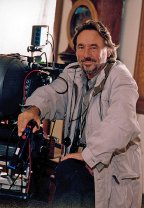Berberian Sound Studio (2013)


Content by Tony Macklin. Originally published on July 6, 2013 @ tonymacklin.net.
There are a lot of people who totally disparage critics. They vow, "I would not see anything the critics recommend."
Boy, do I have a film that will bore and/or infuriate them.
Berberian Sound Studio is a film for critics. General public - come at your own risk.
Critics/reviewers on Rotten Tomatoes, give Berberian Sound Studio a 81% positive rating. The general audience is 51%. That's a 30% difference.
Berberian Sound Studio appeals to many critics because it is stylish, challenging, and daunting. It has multiple layers of meaning that must be plumbed. It demands to be pondered.
Without being literal, and devoid of clear exposition, Berberian Sound Studio may leave much of its general audience in limbo - or hell.
Its ending is abrupt. It may disappoint or provoke.
My wife found the movie "a waste of time." It's not Fast and Furious; for her, it was Convoluted and Confusing.
Set in the mid-1970s, Berberian Sound Studio is the story of sound expert Gilderoy (Toby Jones), who comes to Italy to contribute to the sound mixing in an Italian movie.
He enters a dark studio where the opening credits are showing on a screen. They are garish and intense.
The producer (Cosimo Fusco) says to him, "A new world of sound awaits you."
The film on screen is titled The Equestrian Vortex, but the title is misleading. It's not about horse people. It's a movie of gore, terror, and shocking torture.
"You English. Always hiding," says the producer. Gilderoy's sensibilities are about to be assaulted.
Gilderoy is low-key and inexperienced in the genre of the film he is helping make. Immediately he starts to become alienated from the professional surroundings, the people around him, and the new creative environment. He realizes his background in sound for children's programs and nature films is not going to be relevant for his present task.
He considers the project "a horror film," but the director Santini (Antonio Mancino) passionately disagrees. He pontificates, "It's my duty to show. The world must know the truth. And hear the truth."
Gilderoy becomes unsettled and disoriented as his experience evolves. What will happen to him?
Toby Jones beautifully captures the uncertainty and anxiety of Gilderoy, the estranged sound man.
Berberian Sound Studio could be a film out of the 1970s - it is steeped in alienation.
It also is related to the genre of Italian horror films of the 1970s. It's part spoof, part homage. Absurd and amusing yet serious.
Berberian Sound Studio has some of the vibe of DePalma's Blow Out (1981). It has a powerful emphasis on sound, a palpable ambiance of place, and a provocative psychological journey.
Writer/director Peter Strickland has fun with it. In the credits, Suzy Kendall is listed with a "Special Scream Performance." Kendall was a popular, young actress in the 1960s. She was in To Sir, with Love (1967).
Strickland makes a canny move in not showing images from the film Gilderoy is working on. All we know comes from the soundtrack. Our imaginations are wrested by words and sound effects.
Vegetables and fruit are main characters. To create the sound of horrible impact, melons are chopped and squashes are squashed. Bright red and bright green smash-ups.
As Gilderoy undergoes transformation, the vegetables and fruit deteriorate and rot. A splash of red tomato juice becomes like blood on Gilderoy's forehead.
Berberian Sound Studio is chockful of dualities. One Gilderoy is disheveled and unable to converse in a foreign tongue, another image shows him neat and speaking Italian.
Two letters arrive from Gilderoy's mum. Is the second letter real or demented? And what is the actress Elisa (Chiara D'Anna) doing quoting it?
At the end of the year, many of the films I've seen are a blur lacking distinction. Berberian Sound Studio is a movie of unforgettable images and effects. It has indelibility. I'll remember it.
Perhaps the vital question one should ask after seeing Berberian Sound Studio is: Can one be changed and absorbed by cinema - literally?
A second question: Can a critic ever change viewers?
My wife is waiting to hear.




